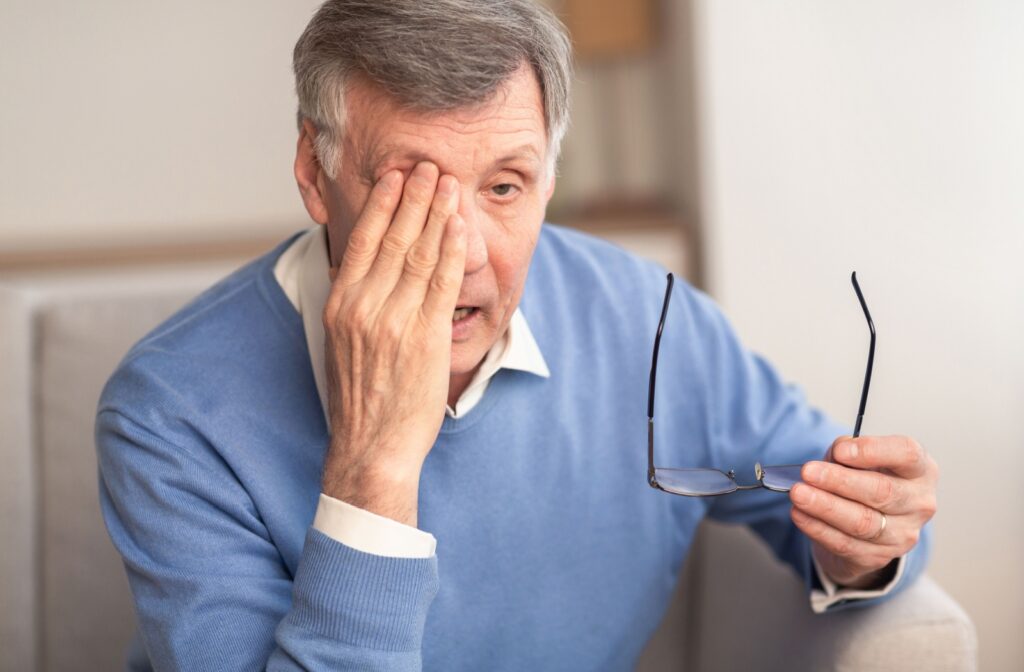One of the most concerning eye diseases is glaucoma. This group of diseases is primarily caused by high pressure in the eye, which damages the optic nerve. It can worsen over time, leading to loss of vision and even blindness.
Glaucoma is diagnosed during an eye exam using an eye pressure measurement technique called tonometry. Glaucoma can be managed, but once vision is lost, it cannot be restored. Getting regular eye check-ups, eating healthy, staying active, and taking doctor-recommended medication are some of the best ways to prevent glaucoma from worsening.
What Causes Glaucoma?
The main cause of glaucoma is pressure buildup inside the eye, commonly known as intraocular pressure (IOP). Your eye continuously produces a clear fluid called aqueous humour, which circulates inside the eyeball, providing nutrients to the surrounding tissues.
But when there’s a blockage that prevents the fluid from draining, the pressure inside the eye starts to build up, which can lead to optic nerve damage. However, what we commonly call glaucoma is actually a group of distinct eye diseases, each with different symptoms and causes, meaning different treatments, too.
The types of glaucoma include:
- Open-angle glaucoma: This is the most common type of glaucoma, accounting for around 90% of all cases. It usually occurs when the drainage canals in the eye become clogged over time, causing increased eye pressure. However, this pressure build-up may not be immediately noticeable, and the condition can only be detected through regular eye exams.
- Angle-closure glaucoma: This type of glaucoma occurs when the iris bulges forward, blocking the drainage canals, resulting in a sudden increase in eye pressure. Symptoms can include sudden eye pain, headache, nausea, and vomiting, and should be treated as an emergency.
- Secondary glaucoma: This type of glaucoma occurs due to other medical conditions such as diabetes, cataracts, or eye injuries.
- Normal-tension glaucoma: Unlike other types of glaucoma, normal tension glaucoma occurs when the eye’s optic nerve is damaged despite having normal eye pressure. Doctors aren’t sure what causes this, and symptoms may not be noticeable until later stages when there’s considerable loss of vision.
Glaucoma Symptoms
One of the biggest challenges with glaucoma is that it often has no symptoms until it has already caused significant damage to the eyes. Many people with glaucoma may not even realize they have the condition until they start to experience vision loss. Glaucoma is sometimes called “The Silent Thief of Sight” for just this reason.
This is why early detection is crucial in preventing further vision loss. Open-angle glaucoma, the most common type, is typically only detectable in its early stages with a comprehensive eye exam.
However, some people may experience symptoms such as:
- Loss of peripheral vision
- Tunnel vision
- Blurriness
- Eye pain
- Eye redness
- Sensitivity to light
- Halos around lights
- Headaches
- Watery eyes
- Nausea or vomiting
Severe symptoms are more common with angle-closure glaucoma, which can cause rapid vision loss if you don’t get immediate treatment.
Treatment of Glaucoma
The primary goal of treating glaucoma is to reduce the intraocular pressure and prevent further damage to the optic nerve. In the early stages of glaucoma, your doctor may prescribe eye drops to help lower the pressure inside the eye.
In more advanced cases, laser surgery or traditional surgery may be necessary to help control the pressure. For example, laser trabeculoplasty and trabeculectomy are 2 surgeries designed to help fluid drain out of the eyes and prevent further damage to the optic nerve. This may only be a temporary solution, so you may need to repeat the procedure if IOP continues to build.
While there is currently no cure for glaucoma, with proper treatment, it’s possible to slow or even halt the progression of the condition.
How to Reduce Your Risk for Glaucoma
While certain risk factors like age and genetics are beyond our control, there are still measures you can take to reduce the risk of developing glaucoma.
Follow a Healthy Diet
Eat a diet rich in eye-healthy foods such as green leafy vegetables, fruits, and fish. Vitamin C, E, and the antioxidants lutein and zeaxanthin have been known to enhance eye health. You could also take a multivitamin supplement with these nutrients or even indulge in antioxidant-rich dark chocolate—in moderation, of course.
Avoid consuming excessive amounts of caffeine as it can increase eye pressure.
Exercise Regularly
Studies show that exercise can reduce eye pressure, while a sedentary lifestyle can increase the risk of developing glaucoma. Even moderate exercises like walking or swimming can help control eye pressure and prevent glaucoma from progressing. You only get this benefit as long as you make it a habit, so aim for 20–30 minutes 3–4 times a week!
Consult with your doctor before starting any exercise routine.
Quit Smoking
Smoking is dangerous to almost every facet of your health, and your eyes are no different. Smoking increases your risk of developing glaucoma, and its progression is accelerated in those who smoke cigarettes regularly since their retinas thin faster. Also, heavy smokers face a higher risk of vision loss due to glaucoma than the occasional or non-smoker.
Get Regular Eye Exams
Glaucoma is preventable and treatable if detected early. Yearly eye exams are essential, especially if you’re over 40 or have a family history of glaucoma. During the exam, your optometrist can measure your eye pressure, inspect the optic nerve, and perform other tests.
Early detection and treatment of glaucoma are the best ways to preserve your vision.

Safeguard Your Vision from Glaucoma
Glaucoma is a serious eye condition that can cause permanent vision loss if left untreated. However, with early detection, it’s possible to prevent further vision loss and slow the disease’s progression.
Eye exams at Annik Eye Care include tests looking for early signs of glaucoma that may otherwise slip past unnoticed. If we uncover it, we can help prevent it from worsening. Take a step towards protecting your sight long into the future and book your eye exam today!



